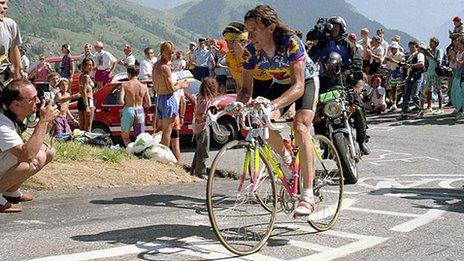Philippa York: 'I'm fine with who I am'
- Published
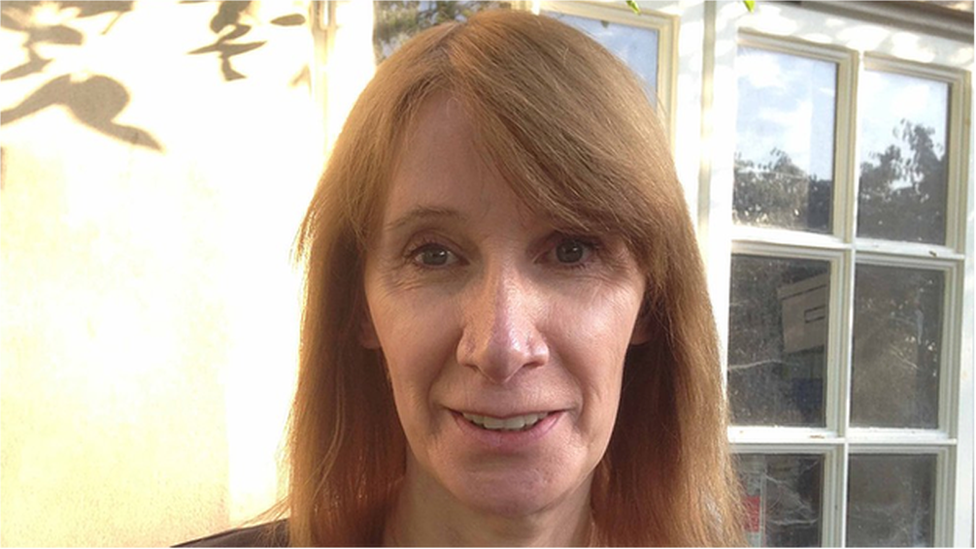
Philippa York has revealed her transition from champion cyclist Robert Millar
"People tend to think that if you are a success you don't have the same struggles and worries as 'normal' people," says Philippa York.
The 58-year-old was speaking about her transition from being Robert Millar, one of Scotland's best ever cyclists.
She went public about her gender change last month, more than a decade after she completed the transition.
Philippa told BBC Scotland's Kaye Adams programme that she had first had the feeling that she was the wrong gender when she was five years old.
"I did function as a boy when I was younger and most of the time I was fairly happy, but there was always that feeling in the background that I didn't really want to be a boy," she says.
Philippa, who was then Robert, became one of Scotland's most successful ever road cyclists after taking up the sport as a teenager.
'Macho situations'
Millar finished fourth in the Tour De France in 1984. At the time it was the highest position recorded by any UK cyclist, and was only recently bettered by Bradley Wiggins and Chris Froome.
The Glaswegian cyclist also won the King of the Mountains prize, awarded to the racer who performs best on the lung-busting, high-altitude stages of the race.
Philippa says of the King of the Mountains title: "It seems rather inappropriate now but that's what it was."
She says: "A lot of trans people find themselves in macho situations. I'm not sure why that is.
"I think you are trying to prove that you can function in that environment."

Cycling career
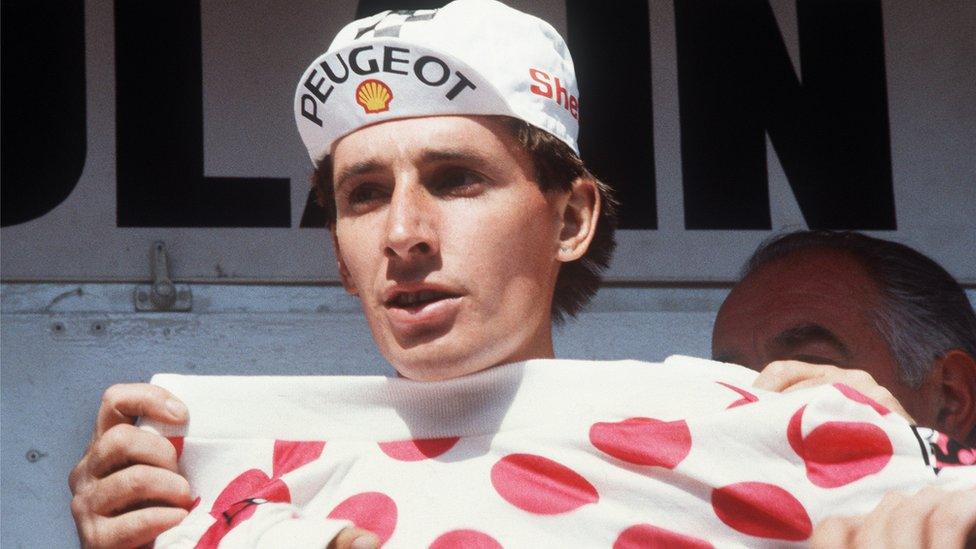
Robert Millar poses with the King of the Mountains jersey at the Tour De France in 1984
Born: 13 September 1958
Birthplace: Glasgow
Amateur clubs: Glenmarnock, Glasgow Wheelers, ACBB (Paris)
Amateur record: Scottish junior champion, British National champion, 4th World Championships
Pro teams: Peugeot, Panasonic, Fagor, Z,TVM, Le Groupement
Selected pro highlights: Tour de France King of the Mountains 1984, 4th Tour de France 1984, 2nd Tour of Spain 1985 and 1986, 2nd Tour of Italy 1987, winner Tour of Britain 1989, winner Dauphine Libere 1990

Philippa says the world of high level competitive sport is a strange one.
"There are lots of people who have got issues, because normal people wouldn't do those things," she says.
"Basically you are proving yourself every day. It is rather stressful, so not everybody can cope with it.
"It is a very different world the one I live in now. I wouldn't say it is the complete opposite but there aren't many similarities."
Born in Glasgow in 1958, the teenage Millar got into cycling as a way of getting out of the city and seeing the surrounding areas.
Almost immediately Millar became an amateur racer and turned professional at the age of 21.

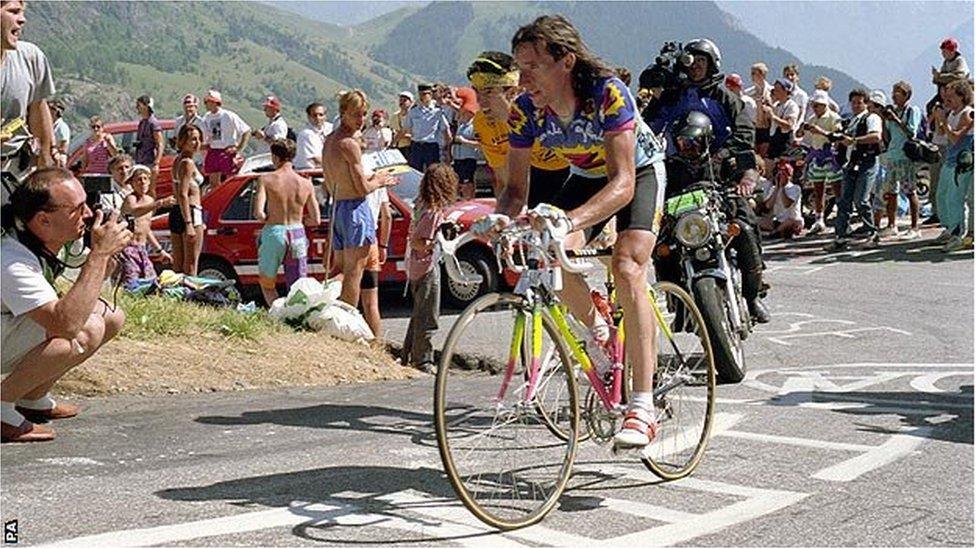
Robert Millar in action in the Alps in stage 11 of the 1990 Tour de France
What happened after cycling success?
Millar retired in 1995 and was then appointed British national road coach
Millar went on to write for several cycling magazines
Reports first emerged in 2000 claiming a gender change, but there was no confirmation from Millar
In 2002, Millar appeared in Manchester with the Scotland team in the Commonwealth Games
Since then public appearances have been rare

The 1984 Tour De France success was followed by second place finishes in the Tour of Spain and the Giro D'Italia in the following years.
A few years after retiring in 1995, and returning to the UK from France, the cyclist began to seek medical help for gender reassignment.
"It is not an easy decision to make," Philippa says.
"It is something I had been considering for a long, long time beforehand.
"Eventually you come to a point where you have to make some sort of decision over how your life is going to move forward.
"For my happiness and everybody's happiness around about me I decided to seek help with it."
'Mini adolescence'
Philippa was married with children when she made the decision, but they did not know about her "internal struggle".
"I didn't really share that stuff until I came back to the UK and then I started dealing with it properly," she says.
Philippa was about 42 when she started the transition process and says it was not easy for anyone.
She says: "It is not a nice thing to deal with for your family. There are a lot of issues that come up.
"It is a process that takes a long time. During it you have crisis, depression, moments of high and lows.
"It is like a mini adolescence over again, except you are a fully grown adult."
Eventually though she felt confident to be Philippa.
'A gradual thing'
"Because it takes so long there was no one date when you think I've done it, I'm going to live as Philippa now," she says.
"It's a gradual thing, it creeps up on you. Now I'm fine with who I am. I'm a middle-aged woman."
Philippa disappeared from public life for many years during and after her transition.
She made a statement about it last month in preparation for a return to commentary with the ITV4 team covering the Tour De France.
She says: "My children and the people around about me have got used to the idea and the offer came along from ITV to do a bit of commentary work.
"It would have been difficult to just appear without explaining what had happened to Robert."
- Attribution
- Published7 July 2017
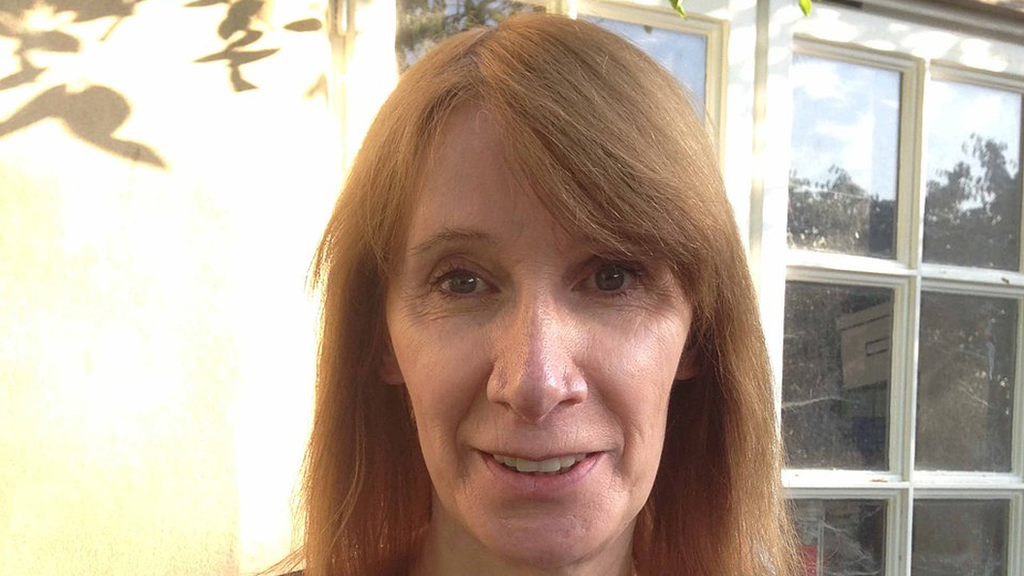
- Attribution
- Published15 April 2012
